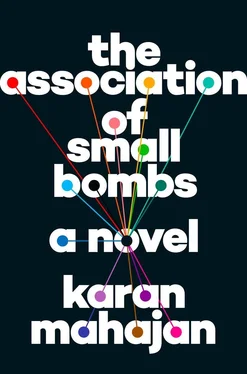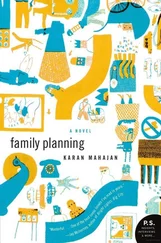She let his hands go and seemed to nod in a deep, knowing way. “I have many nervous tics also,” she said. “I bite my nails. I also pick at my face.” She grinned crookedly. For the first time Vikas noticed how properly filed her nails were, though they were bloodless and devoid of nail polish. The fingers were fragile-looking and wiry and veined with bluish-green vessels, and when Vikas looked at her face again he could suddenly see the vessels crisscrossing her large forehead, throbbing things like the pressings of stems in a scrapbook, the skin of the forehead already crinkled. She was just a mesh of blood, he thought, with pity. A fragile biological creature.
Vikas said, “Have you seen any films by Bergman, by the way?”
“Bergman? Let’s see. Scenes from a Marriage. Persona. Virgin Spring. Through a Glass Darkly . So yes. Four.”
Vikas was truly amazed. “That’s more than I’ve seen, man! I’ve just seen Scenes from a Marriage and Persona .” He said, “He’s a total genius, no?”
“I agree.”
He went on, “Sorry — I don’t know why I brought him up. I just thought, given that you liked Scorsese, you might like Bergman.” This was nonsense and he knew it. He had brought up Bergman because Fanny and Alexander was playing at a festival at Kamani, and he wanted to see if she was going, but he had lost his courage. “Anyway, I’m glad you like Bergman; it makes me happy someone else watches him also.”
“I think he’s quite famous, no?”
“Not here,” he said, indicating the CAs.
She smiled at him with her eyes and nodded back. It took Vikas a second to realize that she was gesturing about her approaching boss. “Chalo,” he said. “We’ll talk later.” But then he didn’t move. He was past embarrassment. The boss came and went. Six months later, they were married.
MANSOOR AHMED’S RESPONSE TO TERRORMAY 1996–MARCH 2003
The bomb became the most significant thing that had happened to Mansoor, cleaving his life into before and after. His hearing got worse for a while, cleaned out by the violent finger of the bomb. He wore a cast on his right arm for two months.
Mansoor’s pain came in enormous fuzzy waves in his arm, doubling him over in his bed. At other times it was a claw of lightning, rapacious and singular, turning his limbs wet from the inside as he walked about the house in his pajamas. When he lingered with his parents at the dining table, a constant drizzle of electricity shocked his arm, and in the mornings his muscles turned sluggish with cement, and wet sand filled the gap between tendons.
When he recalled the day of the bomb, his eyes filled with tears. He hadn’t known till then how selfish he was, and when he felt bad for the boys, it was undercut by a feeling that he was performing for God. And because he felt God could see him he was doubly guilty.
It was lucky, his parents said, that the blast happened in the middle of the summer holidays, giving him time to heal. But maybe, Mansoor would think later, when he was older, his life in ruins, maybe it wasn’t. Had he been forced back to school, forced to confront the mundane dribble of homework and unit tests and weekly exams, he might have recovered faster. Instead he stayed home that summer — disturbed, upset, coddled, winched by nightmares, remembering the bomb, the boys as they lay next to the twisted car door, dropped and broken, and of course their faces before, the moments before, when they’d all been trudging through the market like heroes, talking about the prices of trump cards and bats, and he’d felt irritated at Nakul for acting so certain and authoritative. I know you’re not rich , he’d wanted to say. Why do you act it ? But he’d said nothing. His mind whipped back to the bomb, the meaninglessness of it.
His parents took him everywhere that summer — mosques, dargahs, the Bahá’i temple. Before, they had believed in nothing; now they believed in everything. He was happy to be escorted to these places in the air-conditioned Esteem, but when he found himself in a crowd his heart thundered, his palms sweated, and he looked around at the swirling faces of the devotees. “Mama, please let’s go home,” he begged.
“Of course, beta,” she said, shouting for the driver, who always appeared with a knowing smirk on his face, as if he did not respect his rich young master’s problems.
After that, the holy men trooped home: fakirs, maulvis, sufis, vaids, and the like. Mansoor, his thin legs tucked beneath his knees, said prayers with all of them, letting them press their old-man hands to his head for benediction and drinking whatever potions they offered.
He liked staying home, in the ground-floor flat in South Ex with its emporium-like drawing room crowded with exotic teak furniture from Burma and Indonesia (Afsheen’s father had been in the foreign service and she had grown up partly in Burma). He had no desire to venture out again into the misery of Delhi. When news of the blast welled in the papers, he avoided it, scrambling the pages in a nervous blur till he was at Garfield and Beetle Bailey .
Then, just like that, one day, school began. He was twelve and had places to be.
On the first day of school, he was driven from home in a car by the driver, his parents lapsed on either side of him, his father’s head tilted back and fingers on his lips as he looked out the burning window, a man fulfilling his duty with seriousness and without ceremony, his mother more involved, upright and relaxed and cooing, bringing her cold and fragrant Nivea hands to his forehead. Mansoor smirked proudly as the car gathered the familiar landmarks on the way to school: AIIMS, Bhikaji Cama Place, the sandstone nub of the Hyatt Hotel. He assumed this was special treatment, bound to be suspended in favor of the school bus the minute he was settled into his routine, but when he got ready the next morning, the driver was waiting for him again.
The bomb had killed his friends. But it had improved his life.
________
The children at Vasant Valley School had by now gone through several phases with regard to the bomb, not so different from society itself. Nor were they strangers to bombs, the idea of bombs. Every year some joker called the principal’s office, said a bomb was hidden in a classroom, and everyone poured into the field till the threat had been neutralized. It was always the most memorable day of the year.
So — the children, on summer holiday, had heard about Mansoor and been shocked, or rather tried to act as shocked as their shocked parents; had been bewildered or not based on their experiences with death; and then had forgotten. When they got to school, many were convinced that the deaths of the Khurana boys and Mansoor’s injury were just rumors, like those you sometimes heard about fast senior girls having sex with hoodlums who had finished school. These children were soon proven wrong, giving rise to another round of bewilderment: What could this small Muslim boy have to do with the exploding market? How could he have survived?
“Bhainchod, did you set it off?” one senior with a bobbing Adam’s apple asked.
Mansoor looked at him with confused, cautious eyes.
________
Mansoor’s panic attacks in public spaces did not go away — they got worse. It was absurd, he told his mother, that there was no security in school to protect against terrorists and miscreants, and he was constantly on the lookout for suspicious bulging backpacks; he started violently if a football smashed against the grilles on the churchy windows, grilles designed specially to repel such invasions. In the break period he showed the wound on his right arm to his friends — a long smear of fibrous reddish skin hanging over his veins with the glistening clarity of egg white. Classmates surrounded him at all hours in the brick buildings of the school. It didn’t bring popularity but rather a sort of bland notoriety. He felt like a freak. He was still the only Muslim in school and he wanted to hide.
Читать дальше












